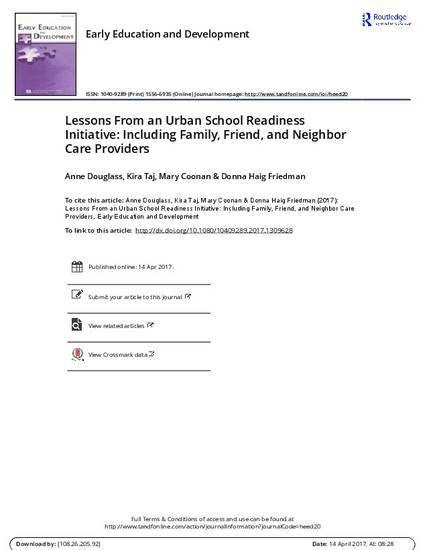
Article
Lessons From an Urban School Readiness Initiative Including Family Friend and Neighbor Care Providers.pdf
Early Education and Development
(2017)
Abstract
Research Findings: Using a structured qualitative case study method, this
study examined one urban school readiness initiative's efforts to identify
and engage family, friend, and neighbor (FFN) care providers to promote
school readiness in underserved and immigrant communities. Interviews and
focus groups were conducted with 23 FFN providers, 14 parent leaders, and
35 community partners in five urban neighborhoods. Results show that 1) a
community-organizing approach was the primary method of engaging FFN
providers, 2) FFN providers self-reported positive impacts of their engagement
for both themselves and the children in their care, and 3) the inclusion
of FFN providers elicited many strong feelings among partners about potential
benefits and liabilities of supporting FFN care, which in some cases acted
as a barrier to successful engagement of FFN providers. Practice and policy:
Results highlight key strategies and potential benefits of engaging FFN
providers in comprehensive school readiness systems. The tensions that
arose regarding the engagement of FFN providers point to the importance
of addressing misconceptions of FFN care and its value to children, families,
and communities in order to ensure a shared commitment and understanding
of the value and possible benefits of such a strategy.
Disciplines
Publication Date
Spring April 14, 2017
DOI
http://dx.doi.org/10.1080/10409289.2017.1309628
Citation Information
Anne Douglass. "Lessons From an Urban School Readiness Initiative Including Family Friend and Neighbor Care Providers.pdf" Early Education and Development (2017) Available at: http://works.bepress.com/anne_douglass/14/
